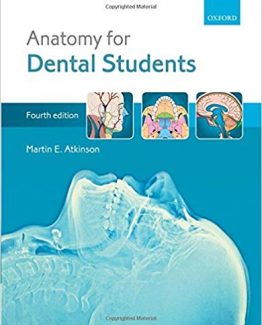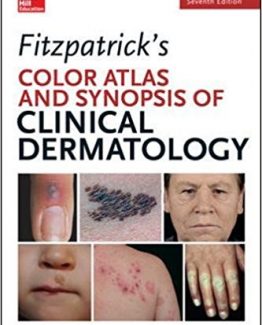Introduction to Clinical Psychology 9th Edition by Douglas A. Bernstein, ISBN-13: 978-1108735797
[PDF eBook eTextbook]
- Publisher: Cambridge University Press; 9th edition (October 29, 2020)
- Language: English
- ISBN-10: 1108735797
- ISBN-13: 978-1108735797
An up-to-date and scientific introduction to the science and practice of clinical psychology for undergraduate and graduate students.
Thoroughly updated and revised, the ninth edition of this bestselling textbook introduces students to clinical psychology as a bridge between science and practice. Extensive revisions since the previous edition have resulted in the most accessible, up-to-date and thematically integrated edition of Introduction to Clinical Psychology yet, while maintaining the authority and accessibility students and instructors have come to rely on. Updates include: three new co-authors who are internationally recognized scholar-practitioners; illustrations of how psychologists use evidence-based practices to help clients; the fictional ‘Jackson family’ case studies, providing vivid examples of a family confronting numerous mental health challenges; ‘Thinking Scientifically’ sections in each chapter, which break down how students can think critically with conflicting findings and use them to draw conclusions; ‘In Review’ tables at the end of each major section prompting students to review the material and test their comprehension; and an expanded image program, printed in color for the first time.
Table of Contents:
Half-title
Title page
Copyright information
Dedication
Contents
Detailed Contents
Preface
Acknowledgments
Significant Dates and Events in the History of Clinical Psychology
1 What Is Clinical Psychology?
Chapter Preview
A Clinical Case
An Overview of Clinical Psychology
The Definition of Clinical Psychology
The Popularity of Clinical Psychology
What Does it Take to Become a Clinical Psychologist?
Clinical Psychology and Related Mental Health Professions
Clinical Psychologists at Work
What Do Clinical Psychologists Do?
Where Do Clinical Psychologists Work?
How Much Do Clinical Psychologists Earn?
Who Are Clinical Psychologists?
Who Are the Clients of Clinical Psychologists?
Clinical Psychology in the 21st Century
Science and Practice
Thinking Scientifically About Evidence
Eclecticism and Integration
The Health-Care Environment
Chapter Summary
2 Clinical Psychology’s Past, Present, and Future
Chapter Preview
The Roots of Clinical Psychology
The Empirical Tradition
The Psychometric Tradition
The Clinical Tradition
Clinical Psychology Begins to Grow
Psychological Testing Expands
Clinicians Become Psychotherapists
Clinicians Form Professional Organizations
Clinical Psychology Branches Out
The Psychodynamic Approach
The Humanistic Approach
The Behavioral Approach
The Cognitive Approach
The Cognitive Behavioral Approach
Social Systems Approaches
The Biological Approach
Comparing Approaches: The Case of Rachel Jackson
Looking Ahead
Mechanisms of Change and Transdiagnostic Approaches
The Burden of Mental Illness and the Science-Practice Gap
Mental Hospitals Versus Prisons and Jails
The Changing Landscape of Clinical Practice
New Approaches to Diagnosing Psychological Disorders
Chapter Summary
3 Basic Features of Clinical Assessment, Classification, and Diagnosis
Chapter Preview
A Clinical Case
An Outline of the Assessment Process
Receiving and Clarifying the Referral Question
Planning Data Collection Procedures
Collecting Assessment Data
Processing Data and Forming Conclusions
Communicating Assessment Results
The Goals of Clinical Assessment
Classification and Diagnosis
Description
Planning and Evaluating Treatment
Prediction
Factors Influencing the Choice of Assessment Instruments
Reliability
Validity
Standardization
Bandwidth Versus Fidelity: A Complex Tradeoff
Other Factors Affecting Assessment Choices
Clinical Judgment and Decision-Making
Clinical Intuition
Improving Clinical Judgment
Communicating Assessment Results
Report Clarity
Relevance to Goals
Usefulness of Reports
Ethical Considerations in Assessment
Chapter Summary
4 Interviewing and Observation in Clinical Psychology
Chapter Preview
Clinical Interview Situations
Intake Interviews
Problem-Referral Interviews
Orientation Interviews
Debriefing and Termination Interviews
Crisis Interviews
Ethnic and Cultural Issues in Clinical Interviews
Interview Structure
Nondirective Interviews
Semistructured Interviews
Structured Interviews
Stages in the Interview
Stage 1: Beginning the Interview
Stage 2: The Middle of the Interview
Stage 3: Closing the Interview
Evaluating the Quality of Interviews
Communication and Miscommunication in the Interview
Reliability and Validity of Interview Data
Observational Assessment
Goals of Observational Assessment
Limitations of Observational Assessment
Approaches to Observational Assessment
Naturalistic Observation
Controlled Observation
Behavioral Avoidance Tests
Research on Observational Assessment
Defining Observational Targets
Representativeness of Observed Behavior
Reliability of Observational Assessment
Validity of Observational Assessment
Chapter Summary
5 Testing in Clinical Psychology
Chapter Preview
Basic Concepts in Psychological Testing
What Is a Psychological Test?
How Are Tests Constructed?
Standardization and Score Interpretation
Avoiding Distortion in Test Scores
Tests of Intellectual Functioning
Theories of Intelligence
The Binet Scales
The Wechsler Scales
Other Intelligence Tests
Aptitude and Achievement Tests
Tests of Attitudes, Interests, Preferences, and Values
Tests of Psychopathology and Personality
Objective Tests of Psychopathology
Objective Tests of Personality
Projective Personality Tests
The Current Status of Psychological Testing
Reliability and Validity of Psychological Tests
Psychological Testing with Diverse Clients
The Ethical Use of Psychological Tests
New Roles and Goals for Psychological Tests
Chapter Summary
6 Basic Features of Clinical Interventions
Chapter Preview
Overview of Clinical Interventions
What Is Psychotherapy?
How Many Psychotherapy Approaches Are There?
The Participants in Psychotherapy
The Client
The Therapist
The Therapeutic Alliance
Settings for Psychotherapy
The Goals of Clinical Interventions
Building a Strong Therapeutic Relationship
Fostering Insight
Providing New Information (Education)
Assigning Extratherapy Tasks (Homework)
Developing Faith, Hope, and Expectations for Change
Ethical Guidelines for Clinical Interventions
The APA Ethics Code
Ethics and the Therapist’s Values
Some Practical Aspects of Clinical Intervention
Treatment Duration and Fees
Record Keeping
Case Formulation and Treatment Planning
Therapist Objectivity and Self-Disclosure
Termination
Two Broad Trends in Clinical Intervention
Chapter Summary
7 Research on Clinical Intervention
Chapter Preview
A Clinical Case
Methods for Studying Psychological Treatments
Basic Designs of Psychotherapy-Outcome Research: Past and Present
Results of Research on Individual Treatments
Client Satisfaction Surveys
Box Score Reviews
Meta-Analytic Studies
Empirically Supported and Evidence-Based Treatments
Evidence-Based Practice
Research on Common or Nonspecific Factors in Therapy
Results of Research on Other Modes of Intervention
Findings on Group Therapy
Findings on Couples Therapy
Findings on Family Therapy
Findings on Preventive Interventions
Findings on Self-Help Resources and Self-Help Groups
Findings on the Combination of Psychotherapy and Medication
Issues and Concerns About Research on Psychotherapy
Concerns and Compromises in Therapy Research
Chapter Summary
8 Psychoanalytic, Psychodynamic, and Humanistic Psychotherapies
Chapter Preview
Psychoanalysis
Freud’s Theory of Personality and Psychopathology
Foundations of Psychoanalytic Therapy
A Case Example of Psychoanalysis
Psychodynamic Psychotherapy
Adler’s Individual Psychology
Jung’s Analytical Psychology
Ego Psychology
Object Relations Therapy
Relational Psychodynamic Psychotherapy
Short-Term Psychodynamic Psychotherapy
The Current Status of Psychodynamic Psychotherapy
Interpersonal Psychotherapy
The Current Status of Interpersonal Psychotherapy
Humanistic Psychotherapy
Person-Centered Therapy
The Goals of Person-Centered Therapy
A Case Example of Person-Centered Therapy
Gestalt Therapy
Existential and Other Humanistic Approaches
The Current Status of Humanistic Psychotherapy
Chapter Summary
9 Cognitive, Behavioral, and Acceptance-Based Psychotherapies
Chapter Preview
Behavior Therapy
Theoretical Foundations
Assessment in Behavior Therapy
Role of the Therapist
Goals of Behavior Therapy
Clinical Applications
Exposure Techniques
A Case Example of Exposure Treatment
Social Skills Training
Behavioral Activation and Activity Scheduling
Aversion Therapy and Punishment
A Case Example of Behavior Therapy
Cognitive Therapy
Theoretical Foundations
Goals of Cognitive Therapy
Cognitive Therapy Methods
Cognitive Behavior and Acceptance-Based Therapies
Theoretical Foundations and Extensions
Clinical Applications
Integrating Cognitive Behavior and Acceptance-Based Therapies
The Current Status of Cognitive Behavior and Acceptance-Based Therapies
Chapter Summary
10 Delivering Mental Health Services
Chapter Preview
Dissemination and Implementation of Clinical Interventions
The Challenges of Dissemination and Implementation
New Models for Delivering Therapy
Group Therapy
Therapeutic Factors in Group Therapy
The Practice of Group Therapy
Cognitive Behavioral Group Therapy
Couples and Family Therapy
Diagnosis in Couples and Family Therapy
Couples Therapy Methods
Family Therapy
A Case Example of Family Therapy
The Social Contexts of Couples and Family Therapy
Alternatives to In-Person Therapy by Mental Health Professionals
Technological Innovations
Non-Specialist Providers
Prevention Science
Community Psychology
Self-Help
Complementary and Alternative Medicine
Chapter Summary
11 Clinical Psychology for Youth and Older Adults
Chapter Preview
A Brief History of Clinical Child Psychology
Unique Characteristics of Clinical Child Psychology
A Focus on Developmental Stages
Attention to the Contexts of Behavior
Processes for Seeking Help
Confidentiality
Clinical Assessment of Children
Special Considerations in Child Assessment
Behavior Rating Scales
Clinical Interviews
Intelligence and Achievement Tests
Projective Tests
Behavioral Observations
Understanding and Dealing with Inconsistent Assessment Information
A Case Example
Treatment and Prevention of Child and Adolescent Disorders
Psychosocial Treatments for Disorders in Children and Adolescents
Pharmacological Interventions
A Case Example
Prevention of Childhood Disorders
The Future of Clinical Child Psychology
Diversity and Multiculturalism
Access to Care
Interdisciplinary Approaches to Research and Practice
Technology and Youth Mental Health
Clinical Geropsychology
A Brief History of Clinical Geropsychology
The Need for More Geropsychologists
Unique Characteristics of Clinical Geropsychology
Training in Geropsychology
Work Settings for Geropsychologists
A Focus on Life-Span Development
Clinical Assessment with Older Adults
Assessment Methods with Older Adults
A Case Example
Treatment of Older Adults
Special Considerations in Treating Older Adults
Treatment Methods and Settings
Pharmacological Treatments
A Case Example
The Future of Geropsychology
Diversity and Multiculturalism
Advancing Technology
Chapter Summary
12 Clinical Psychology, Health, and Well-Being
Chapter Preview
What Is Health Psychology?
Stress, Coping, and Health
Measuring Stressors
Adaptive Coping Strategies
Stress-Hardy Personality Characteristics
Social Support
Risk Factors for Illness
Risk Factors for Cardiovascular Disease
Illness Prevention and Treatment Programs
Cardiovascular Diseases
Pain
Cancer
HIV/AIDS
Improving Adherence to Medical Treatment
Causes of Nonadherence
Interventions to Improve Adherence
A Case Example of Health Psychology
Chapter Summary
13 Clinical Neuropsychology
Chapter Preview
A Clinical Case
A Brief History of Neuropsychology
Early Influences
Development of Neuropsychological Assessment Techniques
Split-Brain Research
Research on Normal Brains
Basic Principles of Neuropsychology
A Modern View of Localization of Function
Modules and Networks
Levels of Interaction
Lateralization of Function
Patterns of Neuropsychological Dysfunction
Occipital Lobe Dysfunction
Parietal Lobe Dysfunction
Temporal Lobe Dysfunction
Frontal Lobe Dysfunction
Neuropsychological Syndromes
Neuropsychological Assessment
Neuropsychological Test Batteries
Individualized Approaches to Neuropsychological Testing
Neuropsychological Assessment and Rehabilitation
Neuropsychological Approaches to Psychopathology
Depression
Schizophrenia
Developmental Disorders
The Current Status of Clinical Neuropsychology
Chapter Summary
14 Forensic Psychology
Chapter Preview
The Scope of Forensic Psychology
Criminal Competence and Responsibility
Criminal Competence
Assessing Competence
The Insanity Defense
Assessing Sanity
Reforming the Insanity Defense
Assessing Psychological Status in Civil Cases
Assessing Psychological Damage in Tort Cases
Workers’ Compensation Cases
Civil Competencies
Psychological Autopsies and Criminal Profiling
Psychological Autopsies
Criminal Profiling
Child Custody and Parental Fitness
Child Custody Disputes
Custody Mediation
Termination of Parental Rights
Mental Health Experts in the Legal System
Chapter Summary
15 Training and Practice Issues in Clinical Psychology
Chapter Preview
Professional Training
The Boulder Conference
The Vail Conference
The Salt Lake City Conference
The Delaware Conference
Clinical Psychology Training Today
Professional Schools and the Doctor of Psychology (Psy.D.) Degree
Clinical Psychology Training Models
Evaluating Clinical Psychology Training
The Internship Imbalance
Professional Regulation
Certification and Licensure
ABPP Certification
Professional Ethics
Ethical Standards of the American Psychological Association
Implementation of Ethical Standards
Dealing with Ethical Violations
Other Ethical Standards
Regulation Through State Laws
Regulation Through Malpractice Litigation
Professional Independence
The Economics of Mental Health Care
Independent Practice
Prescription Privileges
Professional Multicultural Competence
A Case Study of Culturally Competent Therapy
The Future of Clinical Psychology
Training
Psychotherapy Integration
Interdisciplinary Science and Practice
Positive Psychology
Spirituality
Technology
Dissemination
Outreach to National and International Communities
A Final Word
Chapter Summary
16 Getting into Graduate School in Clinical Psychology
Chapter Preview
What Types of Graduate Programs Will Help Me Meet My Career Goals?
Research Versus Clinical Emphasis?
M.A., Ph.D., or Psy.D.?
Am I Ready to Make the Commitment Required by Graduate Programs at This Time in My Life?
Time Commitments
Financial Commitments
Academic and Emotional Commitments
Are My Credentials Strong Enough for Graduate School in Clinical Psychology?
Undergraduate Coursework and Experience
Graduate Record Exam Scores
Grade Point Average
Letters of Recommendation
Given My Credentials, to What Type of Program Can I Realistically Aspire?
I Have Decided to Apply to Graduate School in Clinical Psychology. What Should I Do Now?
How Do I Get Information About Graduate Programs and Identify ”Good” Ones?
What Does It Mean When a Clinical Psychology Graduate Program is Accredited by the American Psycholo
What Does it Mean When a Clinical Psychology Graduate Program is Accredited by the Psychological Cli
When Should I Apply, and What Kind of Timeline Should I Expect?
To How Many Programs Should I Apply?
How Much Will It Cost to Apply?
What Testing is Involved in Applying to Graduate School?
What is the GRE?
Should I Study for the GRE?
How Important is My Grade Point Average?
Will I Need Letters of Recommendation? If so, How Many and from Whom?
What Should I Know About Asking for Letters of Recommendation?
Will I Be Able to See My Letters of Recommendation?
What Should I Include in My Personal Statement?
Are Personal Interviews Required?
How Do I Prepare for an Onsite Interview?
What Kind of Financial Aid Is Available for Graduate Study?
When I Am Admitted to a Program, How Long Will I Have to Make a Decision About Whether to Accept?
Will I Be Successful in Gaining Admission?
What Are Your Rights as a Graduate Student?
Chapter Summary
References
Answer Key
Chapter 1
Chapter 2
Chapter 3
Chapter 4
Chapter 5
Chapter 6
Chapter 7
Chapter 8
Chapter 9
Chapter 10
Chapter 11
Chapter 12
Chapter 13
Chapter 14
Chapter 15
Name Index
Subject Index
Douglas Bernstein is Professor Emeritus at the University of Illinois, and Courtesy Professor of Psychology at the University of South Florida. He founded the APS Preconference Institute on the Teaching of Psychology and the APS Preconference Institute on the Teaching of Psychological Science at the biennial APS International Convention of Psychological Science. He served as the founding chairman of the APS Fund for the Teaching and Public Understanding of Psychological Science. He served for thirty years as chairman of the National Institute on the Teaching of Psychology and has won several teaching awards, including the APA Distinguished Teaching in Psychology Award.
Bethany Teachman is a Professor and the Director of Clinical Training at the University of Virginia in the Department of Psychology. Her lab investigates biased thinking that contributes to the development and maintenance of psychopathology, especially anxiety disorders. She received her PhD from Yale University, Connecticut, and her BA from the University of British Columbia. Dr Teachman has been awarded an American Psychological Association Distinguished Scientific Early Career Award, national mentoring awards, and she is a Fellow of multiple associations, including the American Association for the Advancement of Science. Currently, Dr Teachman is Chair of the Coalition for the Advancement and Application of Psychological Science and she received a Presidential Citation from the American Psychological Association.
Bunmi O. Olatunji is Gertrude Conaway Vanderbilt Professor of Psychology, Associate Professor of Psychiatry and Director of Clinical Training at Vanderbilt University, Tennessee. He has published more than 160 journal articles and book chapters. He has been the recipient of the American Psychological Association (APA) Division 12 David Shakow Early Career Award for Distinguished Scientific Contributions to Clinical Psychology, the Association for the Advancement of Behavioral and Cognitive Therapies New Researcher Award, and the APA Division 12 Theodore Blau Early Career Award for Distinguished Professional Contributions to Clinical Psychology. He is also the recipient of the APA Distinguished Scientific Awards for an Early Career Contribution to Psychology, which recognizes excellent psychologists who are at early stages of their research careers.
The late Scott O. Lilienfeld was Samuel Candler Dobbs Professor of Psychology at Emory University, Atlanta, and Visiting Professor in the School of Psychological Sciences at the University of Melbourne. His primary areas of interest were personality and personality disorders, individual differences in cognitive bias propensity, evidence-based practice in clinical psychology, psychiatric classification, and applications of scientific thinking to psychology. He was (twice) past-president of the Society for a Science of Clinical Psychology and the recipient of several awards, including the James McKeen Cattell Award for Lifetime Contributions to Applied Psychological Science from the Association for Psychological Science and the Ernst R. Hilgard Award for Lifetime Career Contributions to General Psychology from Division 1 (General Psychology) of the American Psychological Association. He was the editor-in-chief of the journal Clinical Psychological Science and author or co-author of over a dozen books, including 50 Great Myths of Popular Psychology (Wiley) and Psychology: From Inquiry to Understanding (Pearson).
What makes us different?
• Instant Download
• Always Competitive Pricing
• 100% Privacy
• FREE Sample Available
• 24-7 LIVE Customer Support






Reviews
There are no reviews yet.